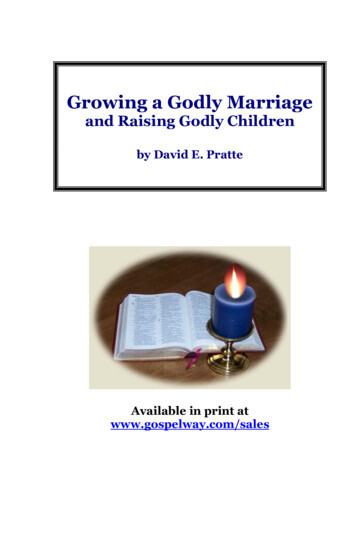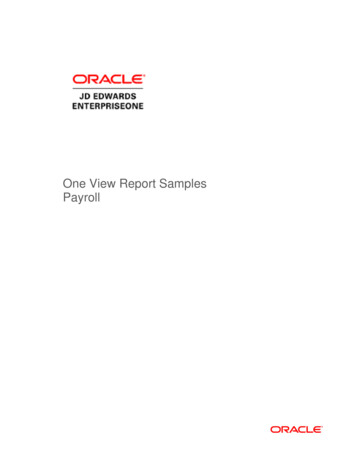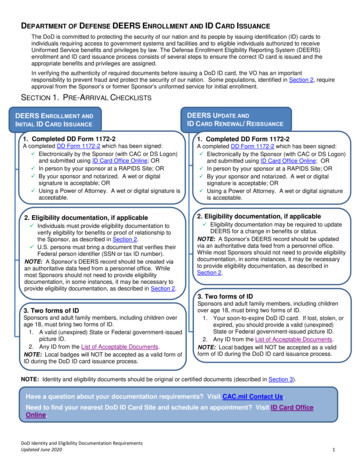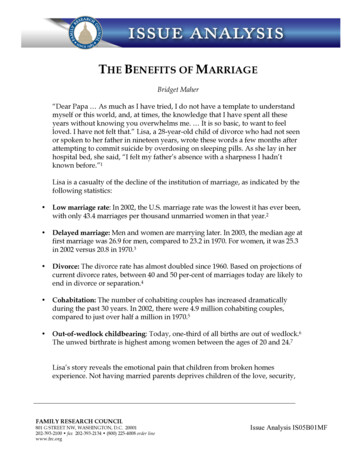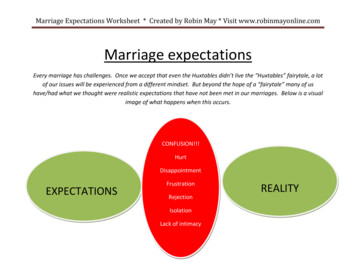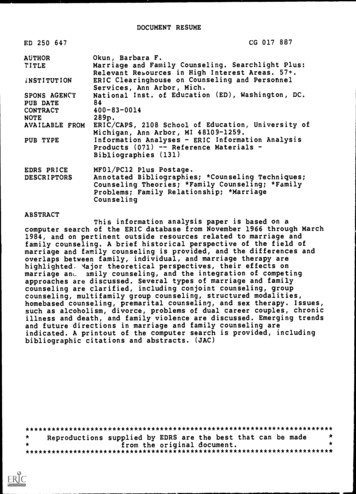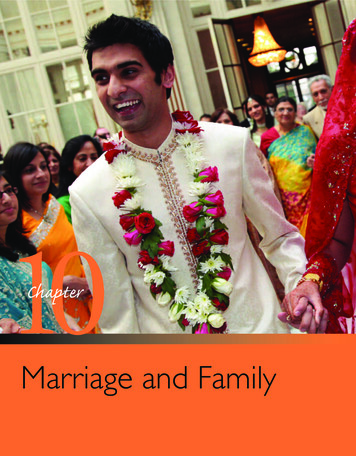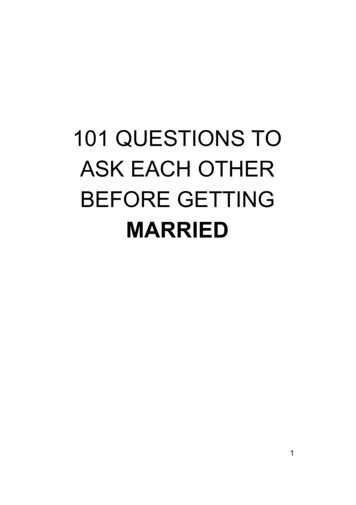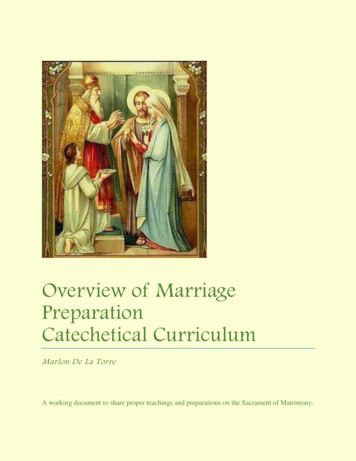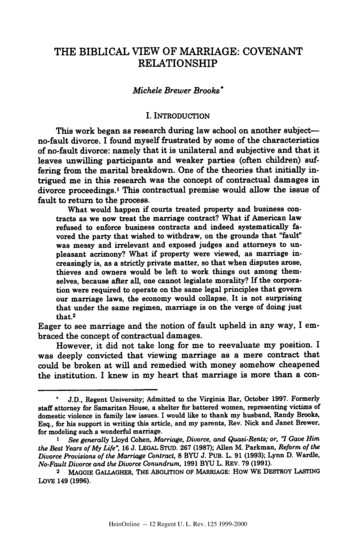
Transcription
THE BIBLICAL VIEW OF MARRIAGE: COVENANTRELATIONSHIPMichele Brewer Brooks*I. INTRODUCTIONThis work began as research during law school on another subjectno-fault divorce. I found myself frustrated by some of the characteristicsof no-fault divorce: namely that it is unilateral and subjective and that itleaves unwilling participants and weaker parties (often children) suffering from the marital breakdown. One of the theories that initially intrigued me in this research was the concept of contractual damages indivorce proceedings., This contractual premise would allow the issue offault to return to the process.What would happen if courts treated property and business contracts as we now treat the marriage contract? What if American lawrefused to enforce business contracts and indeed systematically favored the party that wished to withdraw, on the grounds that "fault"was messy and irrelevant and exposed judges and attorneys to unpleasant acrimony? What if property were viewed, as marriage increasingly is, as a strictly private matter, so that when disputes arose,thieves and owners would be left to work things out among themselves, because after all, one cannot legislate morality? If the corporation were required to operate on the same legal principles that governour marriage laws, the economy would collapse. It is not surprisingthat under the same regimen, marriage is on the verge of doing just2that.Eager to see marriage and the notion of fault upheld in any way, I embraced the concept of contractual damages.However, it did not take long for me to reevaluate my position. Iwas deeply convicted that viewing marriage as a mere contract thatcould be broken at will and remedied with money somehow cheapenedthe institution. I knew in my heart that marriage is more than a con-* J.D., Regent University; Admitted to the Virginia Bar, October 1997. Formerlystaff attorney for Samaritan House, a shelter for battered women, representing victims ofdomestic violence in family law issues. I would like to thank my husband, Randy Brooks,Esq., for his support in writing this article, and my parents, Rev. Nick and Janet Brewer,for modeling such a wonderful marriage.1 See generally Lloyd Cohen, Marriage,Divorce, and Quasi-Rents; or, 7 Gave Himthe Best Years of My Life", 16 J. LEGAL STUD.267 (1987); Allen M. Parkman, Reform of theDivorce Provisionsof the MarriageContract, 8 BYU J. PUB. L. 91 (1993); Lynn D. Wardle,No-Fault Divorce and the Divorce Conundrum, 1991 BYU L. REV. 79 (1991).2MAGGIE GALLAGHER, THE ABOLITION OF MARRIAGE: How WE DESTROY LASTINGLOVE 149 (1996).HeinOnline -- 12 Regent U. L. Rev. 125 1999-2000
REGENT UNIVERSITY LAW REVIEW[Vol. 12:125tract. Indeed, God ordained it, and He had a plan for it. As Christiansought to know, marriage is a solemn covenant, and marriage vows areforever. Every Christian has been told that "God hates divorce,"3 but Iwanted to know more about how God sees marriage.Finally, this topic gained prominence in my thinking as I realizedthat it was simmering in the legal and public policy arenas. There was(and continues to be) a great deal being said about strengthening marriage laws through a concept named "Covenant Marriage." As I understand the current debate, proponents of Covenant Marriage are pushingfor legislation to institute a new class of marriage, encouraging thosewho choose this option to take the step more seriously. The end result?Divorce would be harder to obtain, it is said, for those who are trulycommitted. The idea intrigued me and raised what should be the foremost question for any Christian: What does God think about these efforts? To answer that question, Part II of this article embarks on a journey of definitions. Part III explores the scriptures while part IV builds onscripture. It is here that I will discuss the nature of marriage in terms ofsocial contract. Finally, in part V, I discuss the five historical views ofmarriage.II. CONTRACT AND COVENANT-A JOURNEY OF DEFINITIONSAs legal terms of art, I found the terms contract and covenant to beconfusing. Naturally, I started with the lawyer's tool, Black's Law Dictionary, and found the following:which creContract. An agreement between two or more persons4ates an obligation to do or not to do a particular thing.Covenant. An agreement, convention, or promise of two or moreparties, by deed in writing, signed, and delivered, by which either ofthe parties pledges himself to the other that something is either done,or shall be done, or shall not be done, or stipulates for the truth of certain facts. At common law, such agreements were required to be underseal. The term is currently used primarily with respect to promises inconveyances or other instruments relating to real estate.In its broadest usage, means any agreement or contract.The name of a common law form of action ex contractu, which liesrecovery of damages for breach of a covenant, or contract underfor the5seal.It did not take me long to see that I was not alone in my confusion.These definitions seemed to cloud the issue. At best, covenant appearedto mean an outdated kind of contract. The terms were basically synony3Malachi 2:13-16 (Unless otherwise noted, all references are to the New International Version).4BLACK'S LAW DICTIONARY 322 (6th ed. 1990).5Id. at 363.HeinOnline -- 12 Regent U. L. Rev. 126 1999-2000
1999]THE BIBLICAL VIEW OFMARRIAGE: COVENANT RELATIONSHIP127mous in their definitions. So I next looked to the Second Restatement ofContracts and an English dictionary:"A contract is a promise or a set of promises for the breach of whichthe law gives a remedy, or the performance of which the law in some wayrecognizes as a duty."6"Contract: 1. a binding agreement between two or more persons orparties; one legally enforceable; 2. a business arrangement for the supplyof goods or services at a fixed price; 3. the act of marriage or an agreement to marry."7"Covenant: 1. a usually formal, solemn, and binding agreement;compact; 2. a written agreement or promise usually under seal betweentwo or more parties, especially for the performance of some action; 3. thecommon law action to recover for breach of contract."8To say the least, I was completely unimpressed by the definitionsthat I had found, especially the legal ones. 9 At Regent University'sSchool of Law, I was introduced to a rich concept of common law andnatural law. Unable to accept contemporary legal treatment, I branchedout into different sources that yielded some interesting results:Covenant means that two parties are bound to one another, not onthe basis of a contract where the mal- or non-performance of obligations nullifies the relationship. Some marriages are contracts of thissort. But covenant implies a binding together within which there is astanding together 'in spite of . The 'in spite of element also impliesthat we are ambiguous creatures, mixtures of fulfillment and unfulfillment, hostility and love, desirability and undesirability. The covenant relationship is one in which we continue to be loyal and loving inspite of mutual inadequacies of mutual hurt and frustration. OWhile covenant, in its operational sense, functions to insure the legitimacy of individual partners while binding them in relationship, itmust be emphasized that the covenant is exclusive. The main characteristic of this relationship is that it excludes other possibilities. Forexample, in the marriage covenant, specific conditions are set limitinglike relationships with others. To enter such a relationship outsidethose conditions of the covenant would mean that the covenant has6RESTATEMENT (SECOND) OF CONTRACTS: CONTRACT DEFINED § 1 (1981).7MERRIAM WEBSTER'S COLLEGIATE DICTIONARY 251 (10th ed. 1994).8 Id. at 267.9 Toward the end of my research, I finally came upon a preliminary definition ofcovenant in a non-religious source. See Encyclopedia Britannica Online (visited Apr. 1,1999) http://www.eb.com . Britannica defines a covenant as the following: "a bindingpromise of far-reaching importance in the relations between individuals, groups, and nations. It has social, legal, religious and other aspects. The discussion is concerned primarilywith the term in its special religious sense and especially with its role in Judaism andChristianity." Id.10 STUART D. McLEAN, THE COVENANT AND PRE-MARITAL SEX 5 (Workshop onCovenant and Politics Series 1981).HeinOnline -- 12 Regent U. L. Rev. 127 1999-2000
REGENT UNIVERSITY LAW REVIEW[Vol. 12:125been breached. A series of negative consequences would then flow as aresult of the breach.11"[]n English, contract is generally a matter of private usage,whereas covenant and compact reflect public usage. Contract is a phenomenon of private law; covenant and compact are phenomena of publiclaw." 12"The concept of covenant, in its heart of hearts, refers to a situationwhere a moral force, traditionally God, is a party, usually a direct partyto, or guarantor, of a particular relationship." 13While these definitions provided clues to a religious foundation, itwas not until I understood the Biblical origins of covenant that I discerned a clear distinction, a clear definition, and a clear principle of thedifference between contract and covenant. After analyzing scripture, myconclusions on covenant marriage quickly solidified.III. COVENANT AND THE HOLY BIBLEOne of the most significant terms in the Bible is the word "covenant." Despite its significance, it is often not clearly understood. As thestory of mankind unfolds in scripture, covenants are found to comprisethe foundation of many relationships. God made, among others, a covenant with Abraham14 and later renewed that covenant at Sinai.15 As examples of covenants between men, David made a covenant with Jonathan16 and, later, with the elders of the tribes of Israel when he becameking. 17 Jeremiah foretold the day when God would make a new covenantwith the house of Israel.IS Fulfilling that prophecy, Jesus was presentedas mediator of the New Covenant: "This cup is the new covenant in myblood."19These covenants signify a binding of partners into new or renewedrelationships entailing mutual promises and pledges of reciprocity. Onthe one hand, God binds Himself to such men as Abraham with solemnpromises. On the other, God binds Israel to Himself under solemn obligations--prophetic, from the Christian view, of the day when He willbind Himself to all humanity and humanity to Himself in Jesus Christ in11 GORDON M. FREEMAN, THE DARK SIDE OF COVENANT 1 (Workshop on Covenantand Politics Series 1981).12 DANIEL J. ELAZAR, THE COVENANT IDEA AND POLITICS 3 (Workshop on Covenantand Politics Series 1981).13 Id. at 3-4.14 See Genesis 15, 17.15 See Exodus 6.16 See ELAZAR, supra note17 See ELAZAR, supra note18 See ELAZAR, supra note19 See ELAZAR, supra note12; 1 Samuel 18:1-4.12; 2 Samuel 5:3.12; Jeremiah 31:31-34.12; 1 Corinthians 11:25; Hebrews 12:24.HeinOnline -- 12 Regent U. L. Rev. 128 1999-2000
1999]THE BIBUCAL VIEW OFMARRIAGE: COVENANT RELATIONSHIP129covenant love. Likewise, on a more earthly plane, the Bible speaks repeatedly of men, such as Joshua, Hezekiah, and Josiah, who bound20themselves and the nation in loyalty to God in covenant.It is difficult for those of us in contemporary Western Civilization totruly understand the concept of blood covenant-an Eastern concept.Covenant is the strongest, most sacred, most enduring, binding agreement known to men. 21 Yet, the closest that many of us in our societyhave come to blood covenant is watching Indian chiefs on TV becomingblood brothers by pricking their fingers and rubbing the blood together.22The Bible is set in an Eastern context, and it is in an Eastern context that covenant is best understood.23 When two or more people made acovenant with each other, they made a commitment more valuable thantheir lives.24 They made the basic commitment to each other that "all Ihave and all I am is yours. Your enemies are my enemies, and I amready to give up even my life for you, if need be."2sIn Bible times, a covenant was virtually never broken.26 "It wassuch a sacred commitment that a man would die before he would dishonor himself by breaking a covenant."27 In the East, a man's word in avow or covenant was literally more valuable than his life. It has beensaid that up to 100 years ago if a man ever broke a covenant in Africa,even his own relatives would help hunt him down to kill him.28 In fact,the covenant breaker and his offspring could be hunted and killed for upto four generations for covenant breaking.29 North American Indianshave been reported to have hunted down and killed covenant breakersfor up to seven generations. 30 This same type of mind-set permeatedBiblical culture and still exists in oriental and Middle Eastern culturestoday:It is still such a serious matter in many countries for an ArabMuslim to become a Christian. In their way of thinking, the man is in20 See Joshua 24:25; 2 Chronicles 29:10; 34:31.21 See CRAIG HILL, MARRIAGE: COVENANT OR CONTRACT? 3 (1994). I quote and citethis source heavily throughout this article, especially in this section. The reason I did sowas because there are few sources that specifically discuss marriage as a covenant. Unlikemost Christian books on marriage-that are based on practical ministry--the thesis of thisbook is that marriage is a covenant instituted before God. It is not to be broken for anyreason. If divorce does occur, remarriage is not allowed.222324252627282930See id.See id.See id.Id.See id.Id.See id.See id.See id.HeinOnline -- 12 Regent U. L. Rev. 129 1999-2000
REGENT UNIVERSITY LAW REVIEW[Vol. 12:125covenant through Islam with God and his brothers. In becoming aChristian, according to eastern thinking, a man is breaking this covenant with God and his brothers and thus is worthy of death. In manycultures, his own mother is sworn to seek his death . 3Covenantbreaking in the east is virtually always punishable by death. 'This illustrates the seriousness of the covenant bond. Even the ceremonyto form a covenant was also seriously undertaken. How a covenant wasformed was just as important as enforcing remedies for breach. And noceremony could invoke more serious consideration between covenantorsthan a blood covenant.A The Blood CovenantA covenant is simply one sealed with blood. In the Old Testament,two people would enter into a Blood Covenant like that and theywould go through certain steps to be able to enforce that contract. Oneof the steps was that they would cut their palms or their wrists andrub their hands or wrists together. As the blood mingled, that contractwould be sealed and could be enforced. It could never be broken or dis32annulled.The Old Testament Hebrew word for covenant or agreement isberith.33 To form a covenant (berith) required one to kurath the covenant. This verb kurath means "to cut or divide," alluding to the sacrificial custom of dividing animals34 involved in covenant-making.35 Thus,the best way to describe the covenant-making process is to "cut" a covenant or to use a more familiar expression, "cut a deal."The significance of the Old Testament blood covenant gives us a richunderstanding of the depth of the covenant bond. It is a symbol of unityin which the mixing of blood connotes the act of the covenantors becoming one. In the same way, a covenant of marriage is a symbolic act of twobecoming one. And, rather than being sealed in blood, it is sealed in consummation.The final descriptive concept of Old Testament covenant is that it isan irrevocable and indissoluble commitment valid (at least) until thedeath of one of the covenanting parties. Moreover, a covenant is not bi31Id.32 THEO WOMARANS, BLOOD COVENANT 3 (1984).33 Vine's New Testament Word Search, Context Bible Verse Search (visited Apr. 1,1999) http://www.icinet.org/clm-cgi-bin/vines, 1242 .34 0. PALMER ROBERTSON, THE CHRIST OF THE COVENANTS 7 (1980).3s There were other ways--no less valid-to make a covenant. See, e.g., Genesis21:23-32; 31:53 (s .,bolic action); Exodus 6:8; 19:8; 24:3-7 (symbolic action); Deuteronomy7:8; 29:13 (symbolic action); Ezekiel 16:8 (symbolic action); Genesis 31:44 (the setting up oofa memorial); Joshua 24:27 (the setting up of a memorial); Exodus 24:8 (sprinkling of blood);Psalms 50:5 (offering a sacrifice); Ezekiel 20:37 (passing under the rod).HeinOnline -- 12 Regent U. L. Rev. 130 1999-2000
1999]THE BIBLICAL VIEW OFMARRIAGE: COVENANT RELATIONSHIP131lateral in the sense that it does not depend upon the performance of either party. Rather, it is unilateral in the sense that it is a commitmentmade to another party in the presence of God. The obligations of onecovenantor did not depend on the other's performance, though remedies--as in contract-could be sought for a breach.B. Marriage:A Covenant Instituted by GodWhen one seeks truth, one must look to the author of all truth, Jehovah God. He has given His word as a guidebook for our lives. Thus, theBible is the first place to search for the true meaning of marriage: "In thebeginning God created the heavens and the earth."36 Marriage was notman's idea-it was God's. He created all things and designed them toperform a function within his creation.At the inception of man's existence, God said, "Let us make man inour image, in our likeness; .So God created man in his own image, inthe image of God he created him; male and female he created them .God saw all that he had made, and it was very good. . . ."37 This is perhaps mankind's38 greatest claim to fame: we are created in God's image!We all bear His likeness, and He proclaims that to be good! Note whatimmediately follows man's creation:The Lord God said, "It is not good for the man to be alone. I willmake a helper suitable for him . ." But for Adam no suitable helperwas found. So the Lord God caused the man to fall into a deep sleep;and while he was sleeping, he took one of the man's ribs and closed upthe place with flesh. The Lord God made a woman from the rib he hadtaken out of the man, and he brought her to the man.The man said, "This is now bone of my bones and flesh of my flesh;she shall be called 'woman' for she was taken out of man."For this reason a man will leave his father and mother and be40united 39 to his wife, and they will become one flesh.This great insight into the marriage relationship reveals that first,woman is intended to be a helper for her husband. The scriptural implication is that man needed one. Therefore, woman was created to complement and fulfill his need.36 Genesis 1:1.37Genesis 1:26-28, 31.38 The word "man" in this passage and the word "mankind" refer to both men andwomen.39 The familiar English word used here is cleave, whereas the Greek word used hereis kolloa which means to "join fast together, glue, cement." See Vine's New Tesament WordSearch,supra note 33.40 Genesis 2:18, 20-24.HeinOnline -- 12 Regent U. L. Rev. 131 1999-2000
REGENT UNIVERSITY LAW REVIEW[Vol. 12:125Second, God made Eve with a part of Adam's body, his rib. Why didHe do that? He certainly didn't have to use anything but His own wordsfor creation, but He chose this course. Consummate with His character, Ifind at least two major reasons that God chose to make Eve from Adam'srib. First, God's creation of Eve using Adam's rib provides an interestingparadox: the nature of Eve's role in the marital partnership has nobearing on the fact that both are completely equal before God.41 Second,the very fact that Eve was made from Adam's body symbolizes the oneflesh relationship that a husband and wife share. Certainly, in the sexual consummation of marriage, a husband and a wife become physicallyjoined. The act allows them to again become one for a time. But scriptureimplicates so much more. Men and women, despite their physical separation, seek what they have lost: complete unity. It seems that once aman and woman are joined in the covenant of marriage, they achieve notjust physical unity but also unity of spirit and flesh from that day forward.C. Specific Citationsof Marriageas a Covenant RelationshipWhen I began this research, I did not know of any specific places inthe Bible in which marriage was referred to specifically as a covenant. Ittook some digging, but I did find two places in which marriage is specifically described as a covenant. The first citation is found in the book ofMalachi:You flood the Lord's altar with tears. You weep and wail becausehe no longer pays attention to your offerings or accepts them withpleasure from your hands. You ask, 'Why?" It is because the Lord isacting as the witness between you and the wife of your youth, becauseyou have broken faith with her, though she is your partner, the wife ofyour marriagecovenant.Has not the Lord made them one? In flesh and spirit they are his.And why one? Because he was seeking Godly offspring. So guard yourself in your spirit, and do not break faith with the wife of your youth."I hate divorce," says the Lord God of Israel, "and I hate a man'scovering himself with violence as well as with his garment," says the41See JOHN C. HOWELL,EQUALITY AND SUBMISSION IN MARRIAGE (1979).mhe equality of personhood for man and woman is clearly described in thecreation narratives. In spite of man's failure to fulfill God's will in the storyof the Fall, the Old Testament sets forth a continual enhancement of theintegrity of personhood. Personhood rests upon the image of God in manby creation and upon the recreation of life in Christ through faith in God'srevelation of love at the cross.Id. at 33.HeinOnline -- 12 Regent U. L. Rev. 132 1999-2000
1999]THE BIBLICAL VIEW OFMARRIAGE: COVENANT RELATIONSHIP133Lord Almighty. So guard yourself in your spirit and do not breakfaith.42The second passage, which is equally explicit, is found in the book ofProverbs: "It [wisdom] will save you also from the adulteress, from thewayward wife with her seductive words, who has left the partner of her43youth and ignored the covenant she made before God."D. MarriageCovenant:A Figurative Usage as God's Union with His PeopleThroughout the Bible, God often describes His relationship with Hispeople in terms of a spiritual marriage. This sheds light on how important marriage is to God. Note how the symbol of marriage is used in thefollowing passage:"The time is coming," declares the Lord, "when I will make a newcovenant with the house of Israel and with the house of Judah. It willnot be like the covenant I made with their forefathers when I tookthem by the hand to lead them out of Egypt, because they broke mycovenant, though I was a husband to them," declares the Lord."God is clearly upset and explains His anger-His distrust-in termsof being a husband. But this figurative use of marriage is not limited to anegative connotation, for "[a]s a bridegroom rejoices over his bride, sowill your God rejoice over you."45 One pastor has put it this way:When you make Jesus your Savior and Lord, you are joined to Himas a bride is one with her husband. Self, the old husband, is dead. Youno longer love that husband because you are now joined to another.Adultery is marital unfaithfulness. It is joining yourself to someoneother than your husband, who must have all your allegiance and loyalty. Idolatry is spiritual adultery. It is comprised of joining yourself toanything that divides your loyalty, affections, and faithfulness fromwholehearted love to Jesus. The demand of covenant is wholeheartedlove to the Lordship of Jesus over every area of your life. Whatever divides that love from pure devotion is an idol.4642 Malachi 2:13-16 (emphasis added). It is interesting that the first part of thisverse is often quoted, but one seldom hears the rest of it-that God hates violence as well.43 Proverbs 2:16-17 (emphasis added).44 Jeremiah 31:31-32.45 Isaiah 62:5.46 ROBERT PHILLIPS, COVENANT: ITS BLESSINGS-ITS CURSES 191 (1986).HeinOnline -- 12 Regent U. L. Rev. 133 1999-2000
REGENT UNIVERSITYLAWREVIEW[Vol. 12:125IV. THE NATURE OF CHRISTIAN MARRIAGEThe key words that I have used so far to describe the nature of marriage (Christian and non-Christian) are contract, covenant, and com47mitment.A Social ContractMarriage is a social reality; it is one way that people build relationships within society.48 It also becomes an outward sign of the relationship that has been established between two people before God. It hascredibility in society and is to be respected. It also carries a great deal ofresponsibility.49 In "ancient and contemporary law," marriage has contained legal responsibilities in the nature of contract as well as nonlegal, non-contractual personal responsibilities.50Social customs and laws also influence the way the marriage is established.51 Couples usually meet, date, and get engaged within thebounds of societal expectations. Engagements and weddings are oftentraditional in terms of culture when there is nothing traditional aboutthe couple or their lives. If nothing else, we tend to adhere to culturalexpectations in the forming of a marriage. Religious rites and celebrations are no exception.For instance, people who have not been to church in years oftengreatly desire to have a church wedding. How is this behavior best explained? Another pastor explained that "[r]eligious rites and celebrationshave developed over the centuries which demonstrate the impact of society on the social reality of the family."52 Despite the attitude that generations are "progressive," we tend to do important things as they havealways been done.But make no mistake about it: the joining of a man and a womanin matrimony is a supernatural event, founded upon a mutual exchange of holy pledges . These pledges are the only true vows thatmost people will ever take. They may even be the only truly sacredwords that will ever darken a couple's mouths. The saying of them requires about thirty seconds. But keeping them is the work of a lifetime.S347 See HOWELL, supra note 41, at 14. Howell does a very good job at laying out aframework for marriage in this book. It is an excellent resource for pastors and marriagecounselors--and lawyers--alike.4849See id.50See id.See id.51 See id.52See id.53MIKE MASON, THE MYSTERY OF MARRIAGE: AS IRON SHARPENS IRON 93 (1985).HeinOnline -- 12 Regent U. L. Rev. 134 1999-2000
THE BIBLICAL VIEW OFMARRIAGE: COVENANT RELATIONSHIP1999]1351. Social Contract Between FamiliesThe social contract is also established in and between families.54This was especially true in Old Testament culture in which the wholesociety revolved around the primary social institution-the family.55 "Anindividual really did not exist as a separate person apart from his identification with the family unit."56 In this culture, the father was the truepatriarch of his family; he held all final authority in the home.S5 When ason was to be married, the new wife became a part of the father's household.Since a son's wife became a member of his father's household, itwas customary for the father to choose a wife for his son. Sometimeshe entrusted this responsibility to a loyal servant who would commithimself to carrying out his master's wishes. In either case, the maras a contract between the famiriage arrangements were establishedlies of the bride and groom. 58This did not mean the bride's family was left out. On the contrary, itwas also very important that the bride's family carefully enter into thecontract for their daughter's betrothal. She literally became a part of herhusband's family. Thus, the bride's family took great care to make surethat she would be adequately provided for in her new home.Though today's culture is vastly different, there are immutableprinciples that we should glean from this situation. For example, autonomy from parents is essential to marriage. One should leave his fatherand mother and cleave to his wife, but that does not indicate that theparents are to be left behind completely. Ideally, each child's spouseshould become a member of the other's family. Once people are married,they still need moral, spiritual, and emotional support from their families; roots and extended family ties are obviously important. Mutual9family support is important for a successful marriage.554 See HOWELL, supranote 41, at 15.55 See id. See also Genesis 24:1-67 (illustrating this concept in the story of the betrothal and marriage of Isaac and Rebekah).56 HOWELL, supra note 41, at 15.57 See id.5859Id.This is one area that I feel has been overlooked in our effort to "leave and cleave."As our society has become more mobile, we have misplaced a valuable asset--our families.This is not an excuse for children to remain in the nest. Rather, family provides resourcesthat God intends to be used. Their wisdom, experience, and guidance can be a pricelesstreasure.HeinOnline -- 12 Regent U. L. Rev. 135 1999-2000
REGENT UNIVERSITY LAW REVIEW[Vol. 12:1252. Social Contract With the WorldWhether or not people realize it, marriage constitutes a type of contract with the society in which they live. Even though our culture haschanged dramatically, marriage as an institution is still held in high regard. When people marry, they are in essence declaring to the world thatthey "hold themselves out" as a committed partnership and that theyintend to stay together until death. Included in this "holding out" is theconcept of marital monogamy-the only moral context for sexual expression. Marriage partners promise by marriage that sexuality is to beshared between them and them alone. This, in turn, provides the moststable environment in which to raise children.60 One of the primary purposes of marriage is "to enable children to be born under the best possible conditions, so that they have the loving care of a father and a motherwho will work together, and if necessary sacrifice, for their highestgood."61 Marriage, then, is a stabilizing force in society.Another aspect of the family's contract with society embodies theChristian's primary responsibility--evangelism. Families should beministering to the churc
ought to know, marriage is a solemn covenant, and marriage vows are forever. Every Christian has been told that "God hates divorce,"3 but I wanted to know more about how God sees marriage. Finally, this topic gained prominence in my thinking as I realized that it
